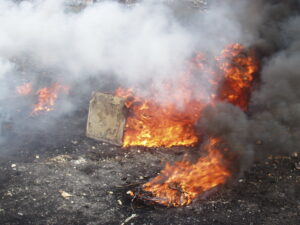World Bank study finds some 16,000 Ghanaians die prematurely from air pollution every year

Air pollution has been cited as the number one environmental danger to public health and it’s the sixth-ranked overall cause of death in the country.
A study published May 30, 2019 in Boston, USA as reported by Ghana Business News, ranked household air pollution as the seventh leading cause of premature death among Ghanaians. According to the report, household air pollution is caused by cooking fuels used in most Ghanaian households – such as firewood and charcoal.
The study conducted by the Health Effects Institute (HEI) – a nonprofit independent research organization established to provide high-quality, impartial, and relevant science on the effects of air pollution on health, also included scientists from Ghana, Canada, India, the United Kingdom, and the United States.
At that time, the authors reported that household air pollution from the burning of solid fuels, for example, wood, coal, charcoal, and other biomass for cooking contributed to nearly 10,000 deaths each year in Ghana.
“It is the 7th leading risk factor for premature mortality in Ghana where approximately 73 per cent of the population relies on solid fuels for cooking. Household solid fuel use (including cooking, lighting, and heating) is a major contributor to the levels of outdoor fine particulate matter that Ghanaians breathe; one study suggests it contributed nearly 65 per cent of the primary particulate matter emissions in the country in 2010,” the report said.
However, a World Bank report finds that there has been an increase in the number of deaths. It states that 100 per cent of Ghana’s population is exposed to air pollution levels exceeding WHO’s guidelines, and 16,000 people die prematurely from it.
“Air pollution is deadly, causing or contributing to heart attacks, strokes, lung cancer, and respiratory diseases. It is Ghana’s number one environmental risk to public health and its sixth-ranked overall risk for death,” says Pierre Laporte, World Bank Country Director of Ghana at the opening of a dissemination workshop on pollution management and environmental health, held September 24, 2021 in Accra.
“Ghana’s air pollution is responsible for eight per cent of total mortality with approximately 16,000 Ghanaians dying prematurely each year. More than half of these deaths are in our cities with nearly as many occurring in rural areas,” he added.
The World Bank study also found that in 2017, air pollution in Ghana had an estimated average cost of $2.5 billion or an equivalent of 4.2 per cent of GDP.
In spite of these known facts, he said, actions to reduce air pollution has been slow.
“Accurately measuring air quality is key to effective responses. However, there is a severe dearth of reliable ground-level air quality measurements,” he said.
He however, stated that the World Bank’s Pollution Management and Environmental Health Pilot Project has been implemented in partnership with the Ghana Environmental Protection Agency to address the issues.
“The collaboration has helped Ghana to address ambient air-pollution and supported the development of a full-scale Air Quality Management Plan for the Greater Accra Metropolitan Area,” he said.
According to Larporte, there is lack of general awareness and media reporting on air quality, pointing out that, resolving the challenge of air pollution and moving society towards improved environmental quality efforts cannot rest only with “experts” but will require the support and active participation of an informed public, noting that the media, civil society and youth groups should become indispensable partners.
“This can be done through their various roles of increasing awareness on the problems, challenges and opportunities towards a sustainable environment and management. For a healthy Ghana, discussions and actions on air pollution issues should begin to gain prominence in the media and in public discourse,” he added.
In his remarks, Ebenezer Ampah Sampong of the Deputy Executive Director of the EPA, Ghana, said air quality kills, and urged the need for action.
“Air pollution knows no boundary and travels from the source of generation to afar, hence the causer of the pollution and the recipient is equally at risk,” he said.
Citing global figures, he said seven million people die annually around the world from exposure to poor air, and over 91 per cent of the world population live in areas where air pollution exceeds national and WHO guidelines.
“Nationally, 28,000 Ghanaians died from air pollution effects in 2017. 2,800 died from avoidable death in the Greater Metropolitan Areas in 2015 and at no action scenario, about 4,600 lives would be lost by 2030,” he warned.
He said in 2014, the WHO estimated that one-third of deaths from heart attack, stroke, lung cancer and lingering lower respiratory tract infections and related diseases result from air pollution.
“Air pollutant emissions in Accra are normally higher along roadside than residential, commercial, industrial locations. Therefore, air pollution is recognized nationally and globally as a major health threat, requiring urgent and collective actions to mitigate its effect,” he said, and urged that good policies, legislation, strategies and interventions are required to control the incidence of air pollution in the country.
“We have the information, we need to ensure enforcement,” he added.
By Emmanuel K. Dogbevi
Copyright ©2021 by NewsBridge Africa
All rights reserved. This article or any portion thereof may not be reproduced or used in any manner whatsoever without the express written permission of the publisher except for the use of brief quotations in reviews
